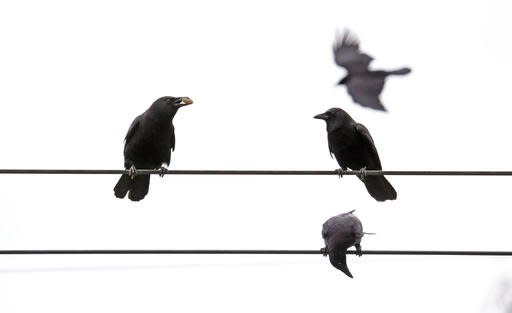In death, a crow's big brain fires up memory, learning

http://syndication.ap.org/AP.Distro.ContentBroker2/ContentBroker.aspx?contentid=adf3cb7f565541f0b02937f2a0ad6c30&iid=0df112bc99b84f0e9b5d7d3336ec6af4&rsn=0&recordid=0df112bc99b84f0e9b5d7d3336ec6af4&filingId=2c877fec293a4a4092552a910bc77262&role=Preview&reldt=2016-03-17T05:26:50&media=Photo&sz=14725&dest=ak&trF=WAET205&ofn=Crow%2bFunerals.JPEG&fmt=jpg&relativeUrl=jpg/2016/201603/17/adf3cb7f565541f0b02937f2a0ad6c30.jpg&s3Key=versions/preview-v00.jpg&authToken=eNoti7sOwyAMAL8IZHAMyYDUX%2bEpeWiIQlA7%2bOPL0OWWu5P6DQ7p2MA7QwgAfsdDModYGubkmyJHpDbTQCWwh0LfbIRYXEaQzmXtQChzhNzP5%2bY0n36PV5qDzzoWBpd669zfMnnFBhzK9Ql%2fYQiEr0BWO22N1Tv9AL4LLdI%3d
SEATTLE (AP) — For nearly every step of his almost 12-mile walk, Darryl Dyer has company. Flocks of crows follow him, signaling each other, because they all know that he's the guy with the peanuts.
"They know your body type. The way you walk," Dyer said. "They'll take their young down and say: 'You want to get to know this guy. He's got the food.' "
Scientists for years have known that crows have great memories, that they can recognize a human face and behavior, and can pass that information onto their offspring.
Nowadays, researchers are trying to understand more about the crow's brain and behavior, specifically what it does when the birds see one of their own die. They react loudly to the dead, but the reasons aren't entirely known.
Among the guesses is that they are mourning; given that crows mate for life, losing a partner could be a significant moment for the social animals. There are anecdotes of crows placing sticks and other objects on dead birds — a funeral of sorts.
Using masks that look creepily human, researchers showed up at Seattle parks carrying a stuffed crow. They recorded the reactions. It takes one crow to signal an alarm, and then dozens show up. They all surround the dead crow, looking at it as they perch on trees or fly above it, a behavior called mobbing.
"Crows have evolved to have these complex social relationships, and they have a big brain," said Kaeli Swift, a University of Washington graduate student who led the study.
How big of a brain? Crows are on par with smart mammals, like dolphins and primates, in brain-to-body proportion. They have been known to be problem solvers and are among the few animals recorded to use tools.
In another part of the experiment, using slightly radioactive tracers, researchers measured the brain activity of crows after they were shown a dead bird. The scans showed the section of the hippocampus — the part involved in memory formation — light up at the sight of death.
"In that particular situation at least, that crow was learning about a place, or a face, or a situation and associated it with that dead crow," said John Marzluff, the lead researcher.
To Marzluff, this and upcoming research on crows highlight a special relationship humans have with a bird that has thrived in its cities and civilization.
"When you see its brain is using the same parts of the brain to remember things that we do, or to learn fearful situations like we do, maybe it gives you a little more sympathy to the bird, or maybe kinship with the bird," he said.
NOW WATCH: Scientists say lifting weights this many times a week may be beneficial for your brain health
See Also:

 Yahoo Finance
Yahoo Finance 
